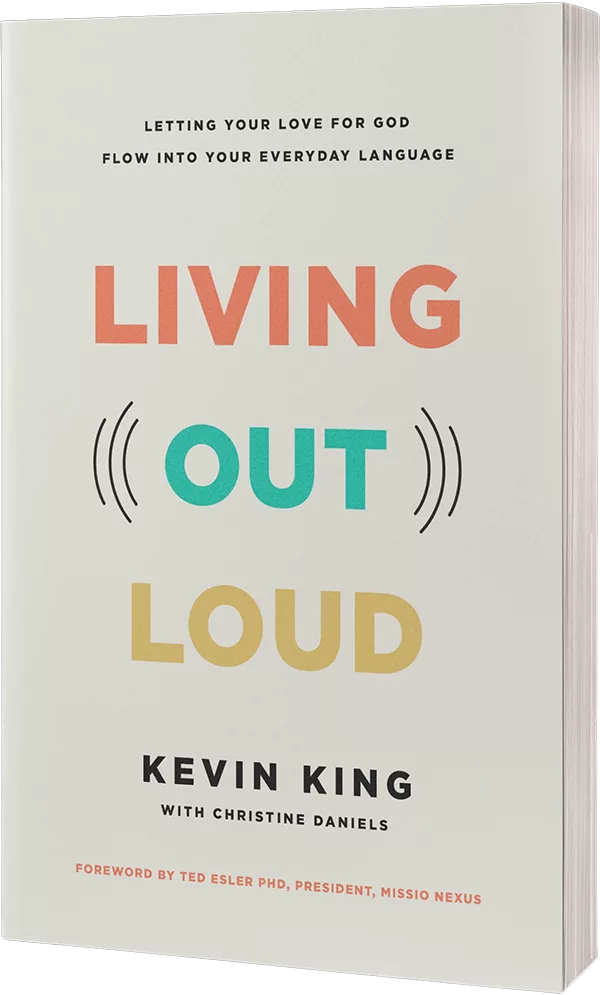Relational evangelism has become a beloved strategy among Christians who want to share their faith without being pushy.
Also called friendship or relationship evangelism, it’s built on the idea that if we build strong friendships with unbelievers, our lives will eventually speak for themselves—and when the time is right, we’ll share the Gospel.
But what if that time never comes? What if our silence is actually stifling the very message we hope to share?
In Kevin King’s evangelistic book Living Out Loud, he challenges the assumptions behind friendship evangelism and calls believers to a more authentic, visible, and generous way of engaging spiritually with others.
If you’ve been faithfully investing in relationships but seeing little fruit, it’s time to ask the hard question: Is your relational evangelism actually working?
In this blog we will look at the shortcomings of this personal evangelism strategy and look at better ways to share Christ.
Make sure you download the free resource at the end!
The Appeal of Relational Evangelism
Relational evangelism is rooted in good intentions. Christians want to love people well, build trust, and avoid turning others into projects.
We’ve been taught that actions speak louder than words, and that if we live like Jesus, people will eventually ask why.
King acknowledges this appeal:
“With such good motives and such overwhelming support for friendship evangelism, how could I possibly say that it’s bad? To stand against friendship evangelism must mean that I am anti-friendship and see people as projects. This, however, could not be further from the truth.”
The problem isn’t the desire to build relationships. The problem is the silence that often accompanies it. The Gospel conversations aren’t happening.
The Bait and Switch
King compares friendship evangelism to a romantic comedy trope: hiding a major part of yourself until the relationship feels safe enough to reveal it. But this strategy backfires.
“Friendship evangelism says that we must first spend a significant amount of time getting to know someone, developing a friendship, building trust, and earning a voice. Once we feel that we have earned the right to speak to them about spiritual things, we start bringing it up in conversation.”
This outreach approach assumes that spirituality is a liability, something to be concealed until the perfect moment.
But as King points out, that moment rarely arrives. Instead, it creates tension, anxiety, and missed opportunities.
7 Reasons Relational Evangelism Falls Short
King outlines 7 compelling reasons why friendship evangelism often fails to produce spiritual engagement and new followers of Christ:
1. It contradicts Scripture’s call to speak openly about God.
“Whether we’re living out the Shema, the Great Commission, or the simple admonition to ‘rejoice always,’ it should be impossible for us not to talk about God with those around us.”
Related: Talk more about God’s love with Shema Statements
2. It assumes spiritual conversations will cause friction.
“Most people are willing to be friends with spiritual people, even if they themselves aren’t interested in spiritual things.”
Related: Spiritual Conversation Starters
3. It undermines trust.
“Hiding a large part of who you are with the intention to expose it later doesn’t make you a trustworthy voice in someone’s life.”
4. It creates pressure to find the ‘right moment.’
“Finding the ‘right moment’ can be so stressful for people that they either actively avoid it or turn it into a dramatic conversation that feels more like a confession than anything else.”
5. It reveals a weak spiritual identity.
“If you can be friends with someone for a good long time without even accidentally blurting out spiritual things, then you might want to evaluate the real place of Jesus in your life.”
Related: God’s Word about Evangelism
6. It treats evangelism as a method, not a lifestyle.
“Living out loud means simply being obvious about who you are and letting God do the work of moving hearts toward him as people interact with you.”
7. It’s not truly loving.
“To say you’re a follower of Jesus and yet have friendships devoid of any mention of Jesus isn’t loving; it’s disingenuous.”
These points cut to the heart of the issue: relational evangelism often prioritizes comfort over conviction, and strategy over sincerity.
Living Out Loud: A Better Way Forward
So what’s the alternative? King offers a simple but powerful discipleship solution: live out loud.
“Living out loud is not a new, alternative way to evangelize. It is learning to live out your true identity as a new creation in Christ. It’s about who you are, not something you do.”
This means being spiritually visible from the start. It means letting your love for God naturally flow into your conversations, your decisions, and your relationships.
It’s not about forcing Jesus into every sentence—it’s about not hiding him from any.
We Christians have spent far too much time suppressing our spirituality when it is actually really easy to be our genuine spiritual selves in conversations.”
Living out loud doesn’t require a script. It requires authenticity in your Christian life. It’s about being who you are in Christ, without apology or delay.
Cast the Seed More Generously
If you’ve been waiting for the right moment to share your faith with non Christians, King has a word for you:
“If you have been looking for the right moment, it’s now.”
The Gospel of Jesus is not a secret to be revealed—it’s a seed to be sown. And sowing generously means speaking openly, living visibly, and trusting God to bring growth.
“Engaging people spiritually doesn’t have to create a storm of anxiety in our minds. Suppressing our spirituality is a tactic of the enemy, not a call from God.”
This is the heart of Living Out Loud: evangelism isn’t a method, it’s a manifestation of who you are. When you live out loud, you cast the seed of the Gospel freely, trusting that God will use your authenticity to draw others to himself.
You don’t have to wait for the Holy Spirit to tell you to share the Good News of Jesus Christ. God has already commanded believers to share Jesus.
Related: Evangelism Bible study guide for churches and small groups
What You’re Missing with Relational Evangelism
If your relational evangelism feels stuck, ineffective, or frustrating, it’s time to rethink your approach.
What you’re missing is living out loud and casting the seed of the Gospel from the start. More than Gospel presentations, it’s about letting your love for God come out.
You don’t need to abandon relationships—you need to infuse them with spiritual visibility. You don’t need to wait for the perfect moment—you need to be who you are in Christ, right now.
Kevin King’s Living Out Loud is a wake up call for believers who want to engage the world with boldness, love, and truth. It’s not about being louder—it’s about being real.
Download 3 Free Chapters of New Evangelism Book
Ready to shift from silent friendship to spiritual engagement? Learn how to live out loud and share the Gospel with authenticity and courage.
Download 3 free chapters from Living Out Loud by Kevin King and discover how to cast the seed more generously, speak more freely, and live more boldly.
Get Free Chapters of Living Out Loud Now
In the new evangelism book, you’ll learn how to have spiritual conversations that flow into Gospel engagement. If you feel like you’ve forgotten how to speak about God or you were never taught how to evangelize, this book is for you.
We respect your privacy.🔒 Your email will only be used to send your free chapters and our related updates—unsubscribe anytime!

Your light was never meant to be hidden. Let it shine.


